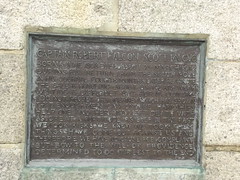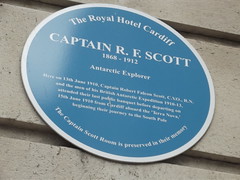Captain Robert Falcon Scott CVO RN


Captain Robert Falcon Scott CVO RN
(1868-1912)
Antarctic explorer, Commander of the Royal Victorian Order, Royal Navy Captain, Discovery Expedition member (1901-1904), and Terra Nova Expedition member (1910-1912)
Family tree
Commemorated on 5 plaques
Robert Falcon Scott Antarctic explorer (1868-1912) lived here
56 Oakley Street, Kensington and Chelsea, SW3, London, United Kingdom where they lived
To The Memory of Captain R. F. Scott CVO DSO RN and his faithful companions Captain L. E. G. Oates, Lieut. H. R. Bowers RIM, Dr E. A. Wilson and Petty Officer Edgar Evans RN who sailed in the S. S. Terra Nova from the Port of Cardiff June 15th.1910, to locate the South Pole; and, in pursuit of that great and scientific task, laid down their lives in the Antarctic Regions. March 1912. "Britons All, And Very Gallant Gentlemen"
Roath Park Boating Lake, Cardiff, United Kingdom where they sailed from the port near (1910)
Scott of the Antarctic. On this site formerly stood 'Outlands' birthplace of Robert Falcon Scott. Born 6th June 1868. Scott died on his return from the South Pole which he reached on 17th January 1912
Scott Road, Plymouth, United Kingdom where they was born (1868)
Captain Robert Falcon Scott. RN. CVO. Born 6 June 1868 died about 29 March 1912 During his return from the South Pole in his journal found 8 months later he wrote "The gale is howling about us we are weak writing is difficult but for my own sake. I do not regret this journey which has shown that Englishmen can endure hardships, help one another and meet death with as great a fortitude as ever in the past. We took risks we knew we took them things have come out against us and therefore we have no cause for complaint but bow to the will of providence determined to do our best to the end."
Captain Robert Falcon Scott statue - College Road, Portsmouth, United Kingdom where they is commemorated
Captain R. F. Scott 1868-1912 Antarctic Explorer. Here on 13th June 1910 Captain Robert Falcon Scott CVO RN and the men of his British Antarctic Exhibition 1910-13 attended their last public banquet before departing on 15th June 1910 from Cardiff aboard the ‘Terra Nova’ beginning their journey to the South Pole. The Captain Scott Room is preserved in their memory.
88, St Mary Street, Cardiff, United Kingdom where they attended a banquet (1910)





